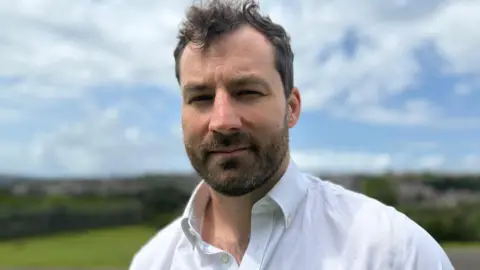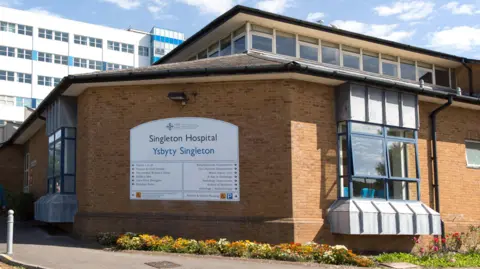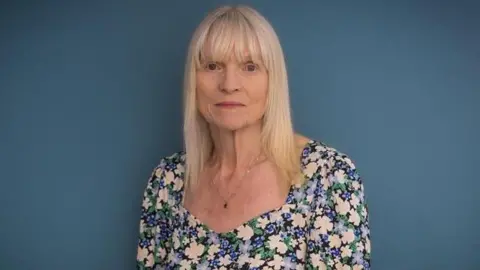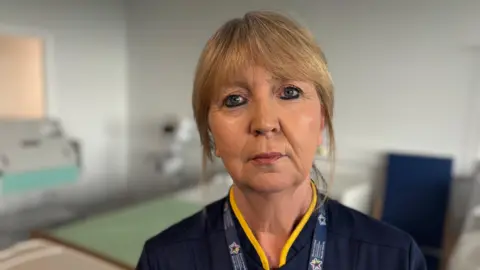Dad demands changes over maternity service failures
 BBC
BBCRepeated failures in the quality of maternity care and governance at a health board have been highlighted in an independent report.
The review was commissioned after complaints by families, as well as concerns about the number of deaths of babies and mothers between 2018 and 2023.
Despite staffing improvements there remain "further actions to be urgently progressed," according to Dr Denise Chaffer, the chairwoman of the review into Swansea Bay health board.
Gareth Morgan, 39, whose son suffered a brain injury during birth, said: "How many more babies and families need to suffer before even small change happens?"
In a meeting on Tuesday, Swansea Bay health board again apologised unreservedly "to all women and families whose care has fallen well below the expected standard".
It has also accepted the findings and recommendations in full and set out initial actions for an improvement plan, adding: "We will work closely with families, partner organisations, stakeholders and regulators to ensure that women who use our services receive the highest standard of care."
While many women had a "mostly positive experience", the review said, some still have "a considerably poor or traumatic experience".
It added: "Some go further and describe instances of severe birth trauma, some of which have occurred in the last year."
These included a lack of compassion, feeling ignore and staff's failure to listen, while there were also "language barriers and lack of cultural awareness" for people from different backgrounds.
Report authors want changes to the complaints process in Wales to make it "less rigid and more compassionate" as well as mental health support for women and families.
They said funding for rapid access psychological support for women and their birthing partners should be considered by the Welsh government.
Significant weaknesses at Swansea Bay were identified between 2021 and 2024, though it noted "some evidence of improvements", the report said "translating high-level changes into tangible improvements on the ground remains a challenge".
 Getty Images
Getty ImagesMr Morgan's wife needed an emergency caesarean when their son was born as she was being treated for sepsis.
He was treated at Singleton Hospital's neonatal intensive care unit for a brain injury sustained during birth.
"It was probably one of the worst points of my life as I thought that both my son and my wife were going to die that day," Mr Morgan said.
A year after his son's birth, the couple received a letter from the health board following an internal investigation into the care she received that found "several major issues that contributed to what happened to him" and suggested the family contact a solicitor.
"You go from thinking it was just bad luck to being angry and you want to find people accountable," Mr Morgan added.
"I'm riddled with trauma. Our family is riddled with the negative experience of what's happened. It's not something you just forget - you live with it.
"When you hear about it happening to other people it affects you all over again. But this isn't about us as a family, this is about the wider picture and there are things that can be done now that can help change future outcomes and that's on the government to do.
"Because ultimately if you're not changing something, if you're not instrumental in in resolving this pan-Wales, pan-UK issue, then you're complicit.
"You're complicit in every negative outcome, every near miss, every bereavement that every family goes through - it's on you.
"How many more babies and families need to suffer before even small change happens?"
The report made a number of recommendations, including:
- A major focus on improving triage quality
- Improving the quality of investigations and involve families and external input
- Having compassionate and trauma-informed care
- Foetal monitoring training for all maternity staff
There were also a number of recommendations to Welsh government, including the revision of the complaints guidance and mental health support for women and families.
 Angharad Stone
Angharad StoneDr Chaffer said: "There is still much to be done to improve maternity and neonatal services and this report serves as a call to action for the health board to do more to rapidly improve the experiences of those who use these services.
"The work of this review does not and must not stop here. The health board must ensure this conversation continues until all changes are made and sustained improvements are demonstrated for the women and families of Swansea Bay."
Liz Rix, Executive Director of Nursing at the health board, apologised to the families that had been affected by the review.
"The review itself does acknowledge some improvements that have already been made, but there is more to do," she said.
Ms Rix said the health board would "develop an improvement plan that will help us to meet all of these recommendations".
"The next steps for us are to continue to listen, to engage with our community and with women and families," she said.

In December 2023 Healthcare Inspectorate Wales found Singleton Hospital's maternity unit failed to meet safe staffing levels over four years and had insufficient measures to stop baby abductions.
Extra staff were recruited, but it was placed into enhanced monitoring by the Welsh government.
A subsequent independent review was announced but criticism from families prompted the first chairwoman to step down.
In May, the body representing patients in Wales, Llais, published its own review after speaking with more than 500 women who had given birth.
It heard about failings in safety, quality of care and respect at almost every stage of the process, with some women deciding not to have more children as a result.
That prompted an apology from health board chairwoman Jan Williams and Health Secretary Jeremy Miles.
Llais chief executive Alyson Thomas said Tuesday's review showed "too many families were let down, often devastatingly, at one of the most important and vulnerable times in their lives".
Miles said "this must never happen again" and has announced an independent person to lead an all-Wales maternity service assessment following the report, which he described as a "harrowing read".
He also escalated Swansea Bay's maternity and neonatal services to the second-highest level of intervention, meaning it will be subjected to enhanced monitoring and increased support.
"There are signs of improvement but we have a long way to go and that needs to be deeper and faster," he said.
The Royal College of Midwives (RCM) welcomed the announcement and said it was a "significant step forward" and something that was "owed to the families who have suffered unbearable loss".
"To truly address the challenges, there needs to be substantial investment in maternity services and a commitment to building a midwifery workforce that ensures we have enough staff to meet the demands being placed on maternity services in Wales," Julie Richards, RCM director for Wales said in a statement.
